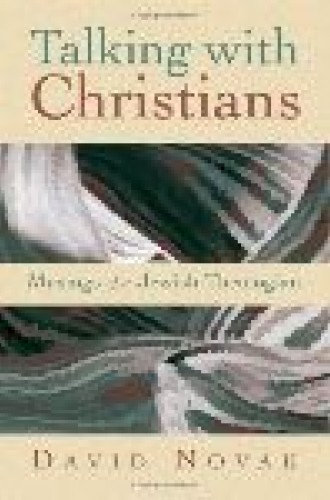Talking with Christians: Musings of a Jewish Theologian
David Novak is one of the most important Jewish theologians writing in English today, and Talking with Christians is an excellent introduction to his thought on relations between Christians and Jews. In Christian circles, Novak is probably best known as one of the principal authors of Dabru Emet (2000), a Jewish statement on Christians and Christianity that was ultimately cosigned by several hundred Jewish rabbis and educators. Dabru Emet (“Speak the Truth”) acknowledges the changes that many church bodies have made in recent years in their teaching on Judaism and calls upon Jews to begin an analogous effort to develop a new Jewish theology of Christianity.
Novak has spent much of the past two decades practicing what he and the coauthors of the statement preach. By his own reckoning a “close disciple” of his teacher Abraham Joshua Heschel, Novak is a veteran of Jewish-Christian dialogue on several continents and has written frequently on the topic in many forums. In an earlier work titled Jewish-Christian Dialogue: A Jewish Justification, Novak proposed a model for how the Jewish tradition can enable Jewish thinkers to treat Christianity with respect, and how that respect can be realized with full theological integrity on the part of the Jewish thinker. In Talking with Christians, Novak gathers 15 of his previously published essays that illustrate in detail what that respectful engagement looks like on specific topics ranging from law and eschatology to the contemporary moral crisis of Western culture.
Novak’s approach to dialogue with Christians represents something of a middle course among contemporary Jewish options. On one side, he disagrees with the late Rabbi Joseph Soloveitchik, who believed Jews and Christians should restrict their dialogue to purely secular matters and avoid matters of faith. Novak believes that Jews and Christians share enough theological common ground to make mutual learning possible on religious as well as secular matters. Of the many essays that illustrate this point I especially like one titled “Buber and Tillich,” which deals with the two theologians’ interpretation of God’s declaration “I am who I am” (Exod. 3:14) and shows in careful detail how each had something important to add to the other’s perception of the passage.
On the other side, however, Novak shies away from the no-holds-barred approach of Michael Wyschogrod, who contends that faith’s commitment to the question of truth makes even the most sensitive points of belief fair game for dialogue between Christians and Jews. In contrast, Novak thinks that dialogue between Jews and Christians works best when some truth claims dear to each community are certainly not surrendered, but left off the table, since, in his view, discussion of them simply leads to impasse.
Within these limits, however, Novak convincingly shows that Judaism and Christianity still have a great deal to learn from each other, in large part because they are so similar to one another structurally and because they face similar challenges in the modern secular world. In several essays, Novak challenges the common view that Judaism is the older faith from which Christianity departs, like a wayward (or especially virtuous) child. In fact, Rabbinic Judaism and Christianity emerged at about the same time out of the common heritage of the Hebrew Bible and late Second Temple Judaism. As a result, even when Christians and Jews seem farthest apart, they are often strangely close together, as Novak demonstrates in another fine essay, titled “Law and Eschatology: A Jewish-Christian Intersection.”
To be sure, this very proximity has at times contributed to the tendency of each community to define the other in exaggeratedly negative ways. But when Christians and Jews today overcome these historic reflexes, as Novak believes Christians in part have done and Jews also should do, then they are well positioned to discover in each other natural allies for challenges that lie ahead.
In “Jews, Christians, and Civil Society,” Novak argues that Jews and Christians should learn to work together to address what he calls “the theopolitical question”—quite simply, how to survive in the secular world “without any hope of conquest or fear of surrender.” For all their evident strengths, liberal democratic societies also pose real dangers for the long-term vitality and faithfulness of both Judaism and Christianity. Jews and Christians can best address those challenges by seeking a new rapprochement with each other and benefiting from the other’s hard-earned wisdom. Christians can learn from Jews what it means to also be a people, and Judaism can learn from Christianity what it means to be primarily a religion.
My favorite essay in the collection is “What Does Edith Stein Mean for Jews?” Written for a Catholic audience on the occasion of Stein’s beatification, the essay movingly illustrates how it is possible to speak with love and candor to those from whom one is separated by a humanly irreconcilable divide. And there is much more in Talking with Christians, including discussions of Thomas Aquinas and Maimonides, Karl Barth and the rabbis, the relation of theology and philosophy, and philosophical proofs for the existence of God.
Talking with Christians delivers handsomely on its title. Christians who want to talk with Jews about serious matters will not want to miss it.






